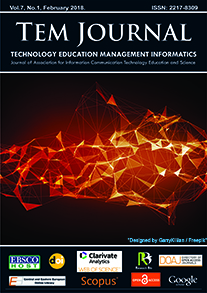Analysing K12 Students’ Self-Efficacy Regarding Coding Education
Analysing K12 Students’ Self-Efficacy Regarding Coding Education
Author(s): Fatih Soykan, Sezer KanbulSubject(s): ICT Information and Communications Technologies
Published by: UIKTEN - Association for Information Communication Technology Education and Science
Keywords: Algorithmic thinking; Coding education; Computer programming; Problem-solving skills
Summary/Abstract: This study aims to analyse a group of k12 students’ self-efficacy regarding coding. The students are receiving “Coding Education” at a private school via Code.org as part of an elective course. The “Coding Self-Efficacy Scale” was used in the study. The scale which consists of 31 items is a 5-point Likert-type scale. The study is a descriptive survey model. The study’s experimental group consisted of k12 students. The research sample is comprised of 193 students receiving coding education. Results will be derived from arithmetic means, standard variation, mode, median, frequency and t analyses of the collected data. At the end of the study, it was identified that the students taking coding education had a higher self-efficacy compared to the students who had not received coding education and that more than half of the students not taking coding education stated that they would like to take this course. It is believed that the study findings will provide an insight for other researchers working in the area of students’ self-efficacy regarding coding.
Journal: TEM Journal
- Issue Year: 7/2018
- Issue No: 1
- Page Range: 182-187
- Page Count: 6
- Language: English

